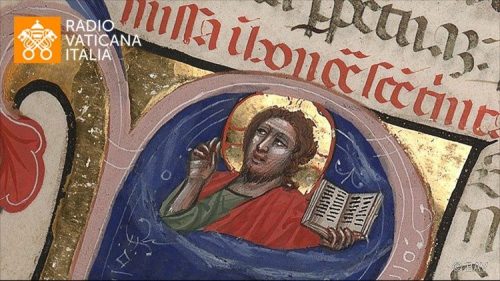READING OF THE DAY
READING 1
GN 3:9-15, 20
After the man, Adam, had eaten of the tree,
the LORD God called to the man and asked him, “Where are you?”
He answered, “I heard you in the garden;
but I was afraid, because I was naked,
so I hid myself.”
Then he asked, “Who told you that you were naked?
You have eaten, then,
from the tree of which I had forbidden you to eat!”
The man replied, “The woman whom you put here with meC
she gave me fruit from the tree, and so I ate it.”
The LORD God then asked the woman,
“Why did you do such a thing?”
The woman answered, “The serpent tricked me into it, so I ate it.”
Then the LORD God said to the serpent:
“Because you have done this, you shall be banned
from all the animals
and from all the wild creatures;
on your belly shall you crawl,
and dirt shall you eat
all the days of your life.
I will put enmity between you and the woman,
and between your offspring and hers;
he will strike at your head,
while you strike at his heel.”
The man called his wife Eve,
because she became the mother of all the living.
READING 2
EPH 1:3-6, 11-12
Brothers and sisters:
Blessed be the God and Father of our Lord Jesus Christ,
who has blessed us in Christ
with every spiritual blessing in the heavens,
as he chose us in him, before the foundation of the world,
to be holy and without blemish before him.
In love he destined us for adoption to himself through Jesus Christ,
in accord with the favor of his will,
for the praise of the glory of his grace
that he granted us in the beloved.
In him we were also chosen,
destined in accord with the purpose of the One
who accomplishes all things according to the intention of his will,
so that we might exist for the praise of his glory,
we who first hoped in Christ.
GOSPEL OF THE DAY
LK 1:26-38
The angel Gabriel was sent from God
to a town of Galilee called Nazareth,
to a virgin betrothed to a man named Joseph,
of the house of David,
and the virgin’s name was Mary.
And coming to her, he said,
“Hail, full of grace! The Lord is with you.”
But she was greatly troubled at what was said
and pondered what sort of greeting this might be.
Then the angel said to her,
“Do not be afraid, Mary,
for you have found favor with God.
Behold, you will conceive in your womb and bear a son,
and you shall name him Jesus.
He will be great and will be called Son of the Most High,
and the Lord God will give him the throne of David his father,
and he will rule over the house of Jacob forever,
and of his Kingdom there will be no end.”
But Mary said to the angel,
“How can this be,
since I have no relations with a man?”
And the angel said to her in reply,
“The Holy Spirit will come upon you,
and the power of the Most High will overshadow you.
Therefore the child to be born
will be called holy, the Son of God.
And behold, Elizabeth, your relative,
has also conceived a son in her old age,
and this is the sixth month for her who was called barren;
for nothing will be impossible for God.”
Mary said, “Behold, I am the handmaid of the Lord.
May it be done to me according to your word.”
Then the angel departed from her.
WORDS OF THE HOLY FATHER
Dear Brothers and Sisters, Happy feast day!
The readings for today’s Solemnity of the Immaculate Conception of the Blessed Virgin Mary present two crucial passages in the history of the relationship between man and God: we could say that they lead us towards the origin of good and evil. These two passages lead us to the origin of good and evil.
The Book of Genesis shows us the first no, the original ‘no’, the human ‘no’, when man preferred to gaze upon himself rather than on his Creator; he wanted to go his own way, and chose to be self-sufficient. However, in so doing, forsaking communion with God, he lost his own self and began to fear, to hide himself and to accuse those who were close by (cf. Gen 3:10, 12). These are symptoms: fear is always a symptom of a ‘no’ to God, and indicates that I am saying ‘no’ to God; accusing others and not looking at ourselves indicates that I am distancing myself from God. This is the sin. Yet, the Lord does not leave man at the mercy of his sin; immediately He looks for him, and asks a question that is full of apprehension: “Where are you?” (v. 9). It is as if He is saying: “Stop, think: where are you?”. It is the question of a father or a mother looking for a lost child: “Where are you? What situation have you gotten yourself into?”. And God does this with great patience, to the point of bridging the gap which arose from the origin. This is one of the passages.
The second crucial passage, recounted today in the Gospel, is when God comes to live among us, becomes man like us. And this was made possible through a great ‘yes’ – that of the sin was the ‘no’; this is the ‘yes’, it is a great ‘yes’ — that of Mary at the moment of the Annunciation. Because of this ‘yes’ Jesus began his journey along the path of humanity; he began it in Mary, spending the first months of life in his mother’s womb: he did not appear as a man, grown and strong, but he followed the journey of a human being. He was made equal to us in every way, except one thing, that ‘no’. Except sin. For this reason, he chose Mary, the only creature without sin, immaculate. In the Gospel, with one word only, she is called “full of grace” (Lk 1:28), that is, filled with grace. It means that, in her, full of grace from the start, there is no space for sin. And when we turn to her, we too recognize this beauty: we invoke her, “full of grace”, without a shadow of evil.
Mary responds to God’s proposal by saying: “Behold, I am the handmaid of the Lord” (v. 38). She does not say: “Well, this time I will do God’s will; I will make myself available, then I will see…”. No. Hers is a full, total ‘yes’, for her entire life, without conditions. And just as the original ‘no’ closed the passage between man and God, so Mary’s ‘yes’ opened the path to God among us. It is the most important ‘yes’ in history, the humble ‘yes’ which reverses the prideful original ‘no’, the faithful ‘yes’ that heals disobedience, the willing ‘yes’ that overturns the vanity of sin.
For each of us too, there is a history of salvation made up of ‘yeses’ and ‘nos’. Sometimes, though, we are experts in the half-hearted ‘yes’: we are good at pretending not to understand what God wants and what our conscience suggests. We are also crafty and so as not to say a true ‘no’ to God, we say: “Sorry, I can’t”; “not today, I think tomorrow”. “Tomorrow I’ll be better; tomorrow I will pray, I will do good tomorrow”. And this cunning leads us away from the ‘yes’. It distances us from God and leads us to ‘no’, to the sinful ‘no’, to the ‘no’ of mediocrity. The famous “yes, but …”; “yes, Lord, but …”. In this way we close the door to goodness, and evil takes advantage of these omitted ‘yeses’. Each of us has a collection of them within. Think about it: we will find many omitted ‘yeses’. Instead, every complete ‘yes’ to God gives rise to a new story: to say ‘yes’ to God is truly “original”. It is the origin, not the sin, that makes us old on the inside. Have you thought about this, that sin makes us old on the inside? It makes us grow old quickly”! Every ‘yes’ to God gives rise to stories of salvation for us and for others. Like Mary with her own ‘yes’. In this Advent journey, God wishes to visit us and awaits our ‘yes’. Let’s think: I, today, what ‘yes’ must I say to God? Let’s think about it; it will do us good. And we will find the Lord’s voice in God, who asks something of us: a step forward. “I believe in you; I hope in you. I love you; be it done to me according to your good will”. This is the ‘yes’. With generosity and trust, like Mary, let us say today, each of us, this personal ‘yes’ to God.
(Angelus, 8 December 2016)

